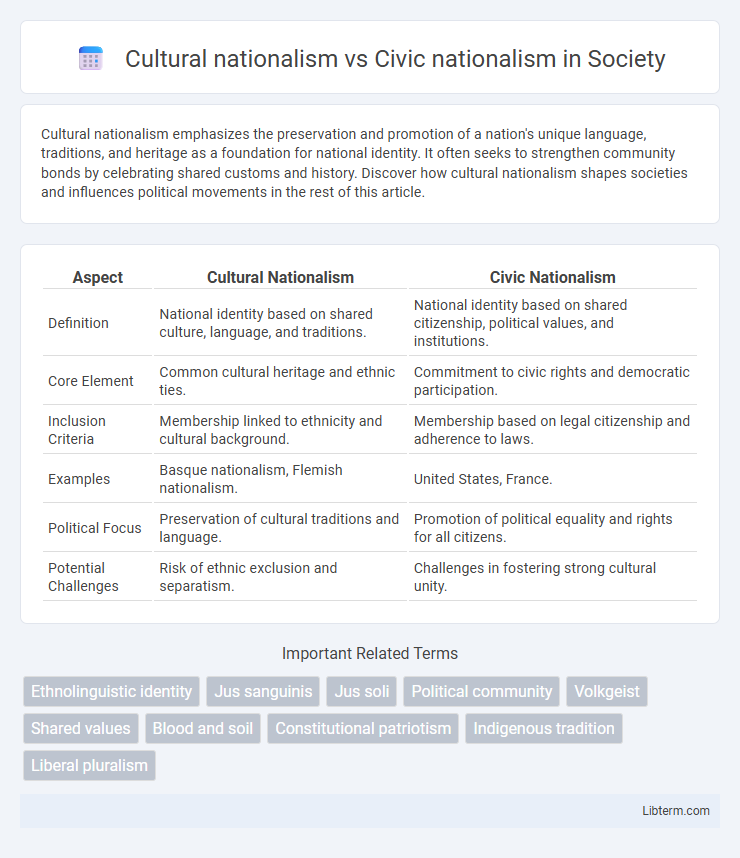Cultural nationalism emphasizes the preservation and promotion of a nation's unique language, traditions, and heritage as a foundation for national identity. It often seeks to strengthen community bonds by celebrating shared customs and history. Discover how cultural nationalism shapes societies and influences political movements in the rest of this article.
Table of Comparison
| Aspect | Cultural Nationalism | Civic Nationalism |
|---|---|---|
| Definition | National identity based on shared culture, language, and traditions. | National identity based on shared citizenship, political values, and institutions. |
| Core Element | Common cultural heritage and ethnic ties. | Commitment to civic rights and democratic participation. |
| Inclusion Criteria | Membership linked to ethnicity and cultural background. | Membership based on legal citizenship and adherence to laws. |
| Examples | Basque nationalism, Flemish nationalism. | United States, France. |
| Political Focus | Preservation of cultural traditions and language. | Promotion of political equality and rights for all citizens. |
| Potential Challenges | Risk of ethnic exclusion and separatism. | Challenges in fostering strong cultural unity. |
Defining Cultural Nationalism: Core Principles
Cultural nationalism centers on the shared heritage, language, traditions, and ethnicity that bind a nation, emphasizing the preservation and promotion of unique cultural identities. It asserts that national identity is deeply rooted in a common cultural experience and often prioritizes cultural homogeneity as essential to nationhood. The core principles include valuing historical continuity, cultural distinctiveness, and the transmission of traditional customs as the foundation of national unity.
Understanding Civic Nationalism: Key Characteristics
Civic nationalism emphasizes shared values, political rights, and legal citizenship as the foundation for national identity, promoting inclusivity regardless of ethnicity or cultural background. It supports democratic governance, individual freedoms, and equal participation in the political process, fostering a sense of belonging through adherence to common laws and institutions. This form of nationalism contrasts with cultural nationalism by prioritizing civic engagement and constitutional principles over ethnic or cultural homogeneity.
Historical Origins of Cultural and Civic Nationalism
Cultural nationalism originated in the 19th century, emphasizing shared language, religion, ethnicity, and traditions as the basis for national identity, often rooted in Romantic nationalism and the rise of ethnic consciousness in Europe. Civic nationalism emerged simultaneously as an inclusive political ideology, focusing on shared citizenship, legal rights, and political participation, influenced by the Enlightenment and the French Revolution's principles of popular sovereignty and republicanism. These historical origins highlight cultural nationalism's ethnic and cultural roots versus civic nationalism's foundation in political and legal frameworks.
Identity and Belonging: Cultural vs Civic Perspectives
Cultural nationalism emphasizes shared heritage, language, religion, and traditions as the core markers of national identity, fostering a sense of belonging based on common ancestry and cultural traits. Civic nationalism defines identity through active participation in political institutions, shared values, and citizenship rights, promoting inclusion regardless of ethnic or cultural background. These contrasting perspectives shape national belonging by privileging either inherited cultural bonds or inclusive, civic-based membership criteria.
Citizenship and Inclusion: Criteria in Both Models
Cultural nationalism defines citizenship based on shared language, ethnicity, and heritage, often prioritizing cultural homogeneity as the criterion for inclusion and membership. Civic nationalism emphasizes legal citizenship and political participation, focusing on adherence to democratic values, institutions, and equal rights regardless of ethnic or cultural background. Inclusion in civic nationalism is typically more inclusive, promoting unity through common civic responsibilities rather than cultural identity.
Political Impacts of Cultural and Civic Nationalism
Cultural nationalism emphasizes a shared heritage, language, and traditions, often leading to policies that prioritize ethnic identity and can marginalize minority groups, influencing political stability and social cohesion. Civic nationalism, based on shared political values and citizenship, fosters inclusive governance models that promote democratic participation and equal rights regardless of ethnic background. Political impacts of these forms of nationalism shape nation-building processes, affect immigration laws, and influence conflicts rooted in identity versus civic belonging.
National Symbols and Narratives: Cultural vs Civic Approaches
Cultural nationalism emphasizes national symbols and narratives rooted in shared heritage, language, religion, and traditions, reinforcing a collective identity based on ethnicity and cultural continuity. Civic nationalism prioritizes inclusive symbols and narratives that reflect shared political values, citizenship, and collective participation regardless of ethnic or cultural backgrounds. National flags, anthems, and historical stories in cultural nationalism highlight ethnic unity, while in civic nationalism, they represent common legal principles and democratic citizenship.
Contemporary Examples Around the World
Cultural nationalism emphasizes shared heritage, language, and traditions as the foundation of national identity, exemplified by Hungary's focus on preserving Magyar culture and Poland's emphasis on Catholicism and national history. Civic nationalism centers on inclusive political values and citizenship regardless of ethnicity, seen in countries like Canada, where multiculturalism and individual rights define national belonging, and India's constitutional patriotism promoting diverse ethnic groups under a common democratic framework. These contrasting models influence immigration policies, social cohesion, and national unity debates in contemporary global politics.
Criticisms and Challenges Facing Both Nationalisms
Cultural nationalism faces criticism for promoting exclusion based on ethnicity, language, or religion, often leading to xenophobia and social fragmentation. Civic nationalism struggles with challenges in fostering genuine political unity as it sometimes overlooks deep-seated cultural identities, resulting in accusations of superficial patriotism. Both nationalisms confront difficulties balancing inclusivity with identity preservation in increasingly diverse and globalized societies.
Future Trends: The Evolving Landscape of National Identity
Cultural nationalism emphasizes shared heritage, language, and traditions as the core of national identity, while civic nationalism centers on inclusive political values and citizenship. Future trends indicate a hybrid approach, blending cultural preservation with inclusive civic principles to address increasing globalization and migration. Advances in digital communication further shape national identity by enabling broader, more diverse participation in defining collective belonging.
Cultural nationalism Infographic

 libterm.com
libterm.com